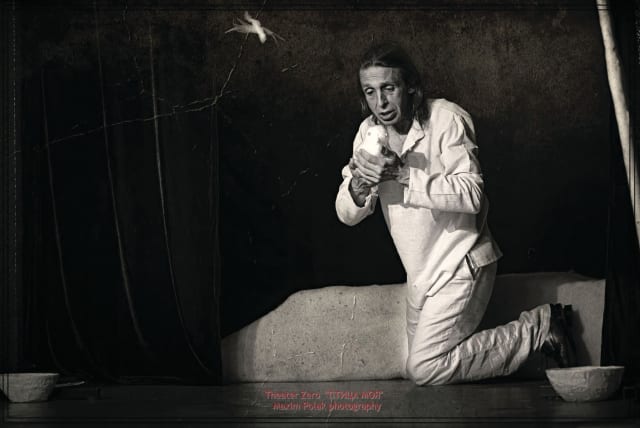Theater review: A Nobel winner revived

This examination of Agnon, the only Hebrew author to win a Nobel Prize, is in step with the trope’s commitment to explore the larger themes of Jewish existence.
A young Jewish boy grows up in Galicia just before the 20th century starts. In Buchach, he goes to heder and attends shul. A bird enters his little world by accident and he looks after it with great compassion, offering his coat buttons to get a cage made and feeding it raisins from his cake. The boy sees the house cat eying the bird and understands something that lives in the sky can’t stay under a roof forever. These are the bare bones of Tzipori (My Bird), by Shmuel Yosef Agnon.
Printed in 1941 as part of the Elu veElu (Those and Those) anthology, which begins with a clash between misnagdim and hassidim in Galicia and ends with the Jews of Buchach making aliyah – the tale is now offered in a new theater adaptation thanks to Oleg Rodovilski and Theater Zero.
Now entering its 21st year, Theater Zero offers mostly Russian-language performances. These include Caligula by Albert Camus and The Shepherd (Pastukh) by Andrei Maksimov – a 1998 play about Lenin – but also some Hebrew productions. In 2017 it performed The Hour of the Wolf, a one-man performance in which Rodovilski inhabited the role of Zionist leader Ze’ev Jabotinsky.
Examining themes of Jewish existence
This examination of Agnon, the only Hebrew author to win a Nobel Prize, is in step with the trope’s commitment to explore the larger themes of Jewish existence.
Rodovilski moves flawlessly between the child-like, energetic stage presence of the boy Agnon describes and the old man receiving an award from the Swedish Academy in the presence of the king. The language constantly alludes to the vast undercurrents of Jewish learning Agnon fathomed.
Thanks to excellent costume design, Rodovilski is able to convince us of this blurring of identity between the sensitive, imaginative child and the bird.
When he wears a large wing or cradles a bird effigy, we can sense the tenderness in Agnon’s heart. This is why the disaster, and pain, lurking in the heart of the play strikes with such force.
In the past decade, there has been a surge of interest in adapting Agnon’s works to the local stage. These include Elit Veber’s Farenheim, Panim Aherot (Another Face) by Anna Beniel, and Pnina Gary’s Temol Shilshom.
In his Nobel Prize speech, Agnon pointedly told the Swedish Academy that “as a result of the historic catastrophe in which Titus of Rome destroyed Jerusalem and Israel was exiled from its land, I was born in one of the cities of the Exile.”
He then added, “Always I regarded myself as one who was born in Jerusalem.”
Coupled with Tzipori, one sees how this historical calamity may be repaired through the love of the land and those who share it with us.
Offered during painful times, Tzipori offers a tearful, yet heartfelt assurance of rising from the ashes and embracing joy.
Tzipori (My Bird), directed by Marina Belyavtseva, will be offered on Thursday, April 25, at 8 p.m. Hebrew only. 50 minutes without intermission. 38 Shlomo HaMelech St. The Art Basement is located behind the bank. 054-780-2339; zero10@zahav.net.il
Jerusalem Post Store
`; document.getElementById("linkPremium").innerHTML = cont; var divWithLink = document.getElementById("premium-link"); if (divWithLink !== null && divWithLink !== 'undefined') { divWithLink.style.border = "solid 1px #cb0f3e"; divWithLink.style.textAlign = "center"; divWithLink.style.marginBottom = "15px"; divWithLink.style.marginTop = "15px"; divWithLink.style.width = "100%"; divWithLink.style.backgroundColor = "#122952"; divWithLink.style.color = "#ffffff"; divWithLink.style.lineHeight = "1.5"; } } (function (v, i) { });

